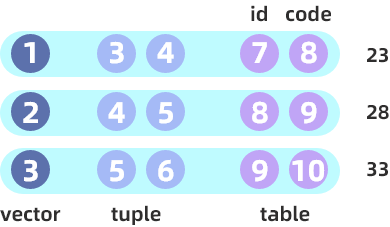Row-Based Functions
For most DolphinDB functions that are applicable to matrices or tables, the calculation is usually conducted based on columns. To calculate on rows, you can use row-based functions.
Introduction
-
Higher-order function byRow:
byRow(func, X) -
Syntax template for unary row-based functions:
rowFunc(args…)Additional unary function template (released with version 2.00.10)
rowFunc(X)Parameters:
args can be a scalar/matrix, or one or more vectors/tuples/tables or their combination. The length of vector, the number of elements of a tuple, and the number of table columns must be the same.
Note: If args is a matrix, return a vector of the same length as the number of rows of the matrix. Please note that multiple matrices are not supported in row functions.
X is a matrix, array vector, columnar tuple, or tuple with equal-length vectors. Note that the following functions do not support tuple with equal-length vectors:
rowRank,rowDenseRank,rowMove,rowNext,rowPrev. -
Syntax template for binary row-based functions:
rowFunc(X, Y)Parameters:
X and Y are matrices/numeric vectors/array vectors of the same size.
The following binary functions accept two columnar tuples as arguments:
rowWavg,rowCorr,rowCovar,rowCovarp,rowBeta, androwWsum,rowCumwsum.
List of Functions
rowFunc(args…)rowAnd, rowOr, rowXor, rowMax, rowMin, rowCount, rowSize, rowSum, rowSum2, rowAvg, rowProd, rowStd, rowStdp, rowVar, rowVarp
rowFunc(X, Y)rowAt, rowBeta, rowCorr, rowCovar, rowCovarp, rowWavg, rowWsum
- Other Row-Based Functions:
(1) args is a matrix:
(2) args is a tuple, matrix, or table
Calculation Rules
To calculate on different data forms, please see the following example.
vec = [1,2,3]
vec_tuple = [[3,4,5],[4,5,6]]
tb = table(7 8 9 as id, 8 9 10 as code)
print rowSum(vec, vec_tuple, tb)
// output: [23, 28, 33]
To calculation on a matrix:
m = matrix(4 2 1 3 5 8, 1 2 5 9 0 1, 3 6 3 2 1 5)
print rowSum(m)
// output: [8, 10, 9, 14, 6, 14]